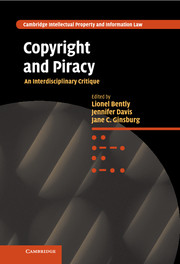Book contents
- Frontmatter
- Contents
- Notes on the contributors
- Editors' preface
- Table of cases
- Table of statutes
- Part I Introduction
- Part II History
- Part III Comparative Law
- Part IV Economics
- Part V Linguistics
- Part VI Computer software
- Part VII Information studies
- Part VIII Literature
- 14 Unoriginal genius: plagiarism and the construction of ‘Romantic’ authorship
- 15 The genius and the labourer: authorship in eighteenth and nineteenth-century copyright law
- Part IX Art
- Part X Sociology/music
- Part XI Criminology
- Bibliography
- Index
15 - The genius and the labourer: authorship in eighteenth and nineteenth-century copyright law
from Part VIII - Literature
Published online by Cambridge University Press: 17 November 2010
- Frontmatter
- Contents
- Notes on the contributors
- Editors' preface
- Table of cases
- Table of statutes
- Part I Introduction
- Part II History
- Part III Comparative Law
- Part IV Economics
- Part V Linguistics
- Part VI Computer software
- Part VII Information studies
- Part VIII Literature
- 14 Unoriginal genius: plagiarism and the construction of ‘Romantic’ authorship
- 15 The genius and the labourer: authorship in eighteenth and nineteenth-century copyright law
- Part IX Art
- Part X Sociology/music
- Part XI Criminology
- Bibliography
- Index
Summary
The idea of originality has long engaged the attention of literary scholars. It also attracts the scrutiny of lawyers through its central role in copyright law. Consequently, it provides fertile ground for interdisciplinary study and significant and influential work has been done in this area by Martha Woodmansee, Peter Jaszi and Mark Rose. This work links the emergence of the proprietary model of authorship with the construction of Romantic authorship, the link being forged in the fire of the literary property debates which culminated in the cases of Millar v. Taylor and Donaldson v. Becket. The focus of such work is thus on the similarities to be found in the fields of law and literature in this period, the shared rhetoric and the players found in both camps. But concentrating attention on the cases relating to the question of common law copyright and the debates they engendered has obscured the fact that the courts were also required to deal with other disputes relating to the printing and selling of books in this period and, in such cases, aesthetic theories of creative originality were distinctly absent.
Nick Groom in his contribution to this volume (Chapter 14) seeks to reposition the concept of originality by viewing it as a response to plagiarism, itself acquiring a new significance when the rise of professional authorship meant it posed a threat to authorial earnings.
- Type
- Chapter
- Information
- Copyright and PiracyAn Interdisciplinary Critique, pp. 300 - 308Publisher: Cambridge University PressPrint publication year: 2010



